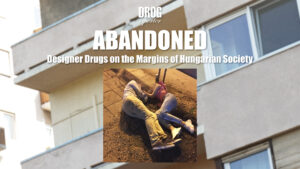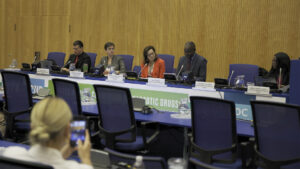The Office of the UN High Commissioner for Human Rights called civil society organisations to contribute to its report on the implementation of the UNGASS Outcome Document, adopted in New York in 2016. We have sent a submission about how closing down harm reduction services violated human rights in Hungary – read it below!
Current situation
The right to health for people who inject drugs is at risk in Budapest due to actions in recent years. Two key needle exchange programs in Budapest have been closed in recent years due to political pressure. A shift in drug use from heroin to NPS and amphetamine increased the amount of needles needed as well as the number of individuals seeking treatment at Needle and Syringe Programmes (NSPs). This led to pressure from local politicians to defund and move the clinics out of their areas. We hope The High Commissioner for Human Rights will draw attention to the importance of harm reduction services in its report as a health and human rights issue. Adequate funding and protection against politically motivated pressure are important so we can serve marginalized groups.
The provision of sterile injecting equipment remained low (at present, appr. 30 needles per IDUs per year) in Hungary and neither of the closed programs were re-opened or replaced. Despite recommendations coming from the ombudsman, the United Nations Secretary-General’s Special Envoy for AIDS in Eastern Europe and Central Asia, and civil society, the Hungarian government refused to provide adequate funding for harm reduction programs and scale up coverage. Even the HIV monitoring program was halted in 2016. Although significant investments were made from EU structural funds in the field of recovery and social rehabilitation, harm reduction remains underfunded. Some programs reported that the police have harassed their social workers. The government also refused to include harm reduction into its national action plan on drugs (1669/2017. (IX. 15.) government decree for 2017-18, the new plan is being prepared this year). Below we provide background on the situation and offer some specific recommendations that OHCHR might consider.
Background
The UNGASS Outcome Document “invites relevant national authorities to consider, in accordance with their national legislation and the three international drug control conventions… effective measures aimed at minimizing the adverse public health and social consequences of drug abuse, including … injecting equipment programmes.” It promotes the use of “the technical guide for countries to set targets for universal access to HIV prevention, treatment and care for injecting drug users, issued by the World Health Organization, the United Nations Office on Drugs and Crime and the Joint United Nations Programme on HIV/AIDS.”
The technical guide established an indicator of at least 200 sterile needles and syringes per injecting drug user per year for high coverage of needle and syringe programs (NSP). The guide acknowledges that this rate should be even higher when stimulants are injected.
Growing Demand – Reduced Supply of Needles
After 2010, a major shift was observed among injecting drug users from heroin and amphetamine to (cheaper and more available) new psychoactive stimulants (NPS), especially Cathinones. By 2014 the proportion of heroin users among NSP clients decreased to less than 10 percent. NPSs are injected much more frequently (10-15 times day) and in a more risky way (without cooking, filters etc.) thus the demand for sterile injecting equipment was going up. NPS users could not be admitted to OST. In the same period, national funding for prevention programs, harm reduction and treatment services steadily decreased between 2009 and 2012, falling from 752 million forints to 129 million forints (EUR 418,000) annually. NSPs had to limit the distribution of equipment, reduce opening hours and dismiss staff members in 2012.

Political Attacks Against Budapest NSPs
In the same period, growing injecting drug use caused anxiety among people living in the most affected parts of Budapest, such as the 8th district, home to a large population of impoverished injecting drug users. The NGO Blue Point had been operating the Contact harm reduction center in the 8th district since 2006, with the largest NSP in the country. This program connected with 3,000 clients who were completely invisible to the treatment system before. The local mayor, Máté Kocsis accused the program of “attracting drug users” to the district and thus, were responsible for abandoned needles on the street. These accusations were not supported by any evidence. In September 2013, the Municipal Council of the district decided to terminate the contract with the Blue Point Foundation. This meant that their rent for the center increased threefold and became unaffordable. The NGO was excluded from the local drug coordination council as well. The mayor indicated that his intention is to close down the service. In January, local politicians organised a street protest to shut down the program.
Closure of the Two Largest NSPs
Blue Point announced in June 2014 that, due to the hostile political climate and lack of financial resources, they would have to close down the program in September 2014, unless the national government gave them political support and an emergency grant. The Ministry of Human Resources rejected their appeal, saying that they have no extra-budgetary funds for needle exchange and calling the incident “a local legal conflict” where it cannot intervene. However, contradicting this statement about lack of resources and intervention, the government provided support and a 55,000 USD drug-related grant to the district’s mayor – and not the NGO. The program closed at the end of August 2014. A similar situation occurred in the 13th district in 2015. Due to an increased number of clients and pressure from the neighborhood, another NSP operated by the NGO Drug Prevention Foundation was closed down by the mayor of the 13th district in March 2015. These two NSPs provided more than 50 percent of all distributed sterile needles before 2014 in Hungary.
Public Health Consequences
Due to the combined effect of reducing the number of distributed sterile needles and increasing demand for sterile equipment among NPS injectors, Hepatitis C infections tripled in Hungary (and doubled in Budapest) between 2011 and 2014. What is even more worrying is the fact that by closing down the two largest harm reduction programs, thousands of high risk drug users have become invisible to the treatment system and it is impossible to keep track of the real epidemiological trends. That is, an outbreak of HIV can go undetected.

Legal Background: Hungarian Legislation
Since the first national drug strategy (96/2000. [XII.11.] parliamentary resolution, 2000-2009), harm reduction programs have been an integral part of drug policy in Hungary, with significant investments from governments to scale up services in the first decade of the 21st century. In 2004 the Budapest Metropolitan Police (BRFK) and NSPs signed a memorandum of understanding about the operation of NSPs in which the police pledged not to harass the clients of harm reduction programs. 65/A. § of the Act on Social Care of 1993, amended in 2007, made it a state responsibility to provide funding for low threshold services, including NSP. However, access to NSP has never reached the upper limit of medium coverage according to the UN technical guide and fall into the low coverage category after 2010. The current national drug strategy (80/2013. [X. 16.] parliamentary resolution, 2013-20) acknowledges that “harm reduction programs contribute to the reduction of drug related infections, crime and overdoses,” and it promotes “the stigmatisation-free access to low threshold programs,” and “reaching out hidden populations of drug users to include them into treatment, prevention of infectious diseases, testing and counseling.”
The 2014 Report of the Ombudsman Condemns the Closure as Human Right Violation
The Hungarian Civil Liberties Union (HCLU) submitted a complaint to the Commissioner for Fundamental Rights, asking him to investigate political attacks by the mayor of the 8th district of Budapest against the needle and syringe program operated by the Blue Point NGO. In his report, the ombudsman, referring to a previous ruling of the Constitutional Court, defines the violation of the right to the highest attainable standard of health as an “exceptional, extreme shortfall in access to health care”. Closure of an existing harm reduction service, in an area where large numbers of marginalised injecting drug users live, and where the risk of infections is high, is precisely such an exceptional case. “We cannot forget the fact that this program, terminated because of the decision of the mayor of the 8th district of Budapest, was an evidence-based intervention supported by the national drug strategy of the Hungarian government,” the ombudsman points out. “Such termination, without replacement by other services, violates the principle of the progressive realisation of the right to health.” The ombudsman recommended that the mayor provide access to harm reduction services, urged the Minister of Human Resources to help clarify the role of needle and syringe programs, and recommended creating a Drug Coordination Forum for Budapest, in order to make drug policy responses in the city more effective. Neither the national nor the local government accepted the recommendations but they accused the ombudsman “of being controlled by the pro-drug lobby.”
Recommendations to the OHCHR
Hungary-specific recommendations:
1. Condemn the closure of needle and syringe programs as a breach of the spirit and
letter of the OD and a violation of the right to health and to the right to a healthy
environment;
2. Call upon the mayors of District 8. and 13. of Budapest to invite NGOs to re-establish
needle and syringe programs in their districts;
3. Call upon the mayor of Budapest to create an urban drug strategy and drug
coordination system.
Universal recommendations:
1. Request governments include harm reduction into their national action plans on drugs;
2. Request governments implement and support harm reduction services for NPS and
amphetamine substances;
3. Call upon governments to allocate adequate funding for harm reduction programs.
Peter Sarosi






